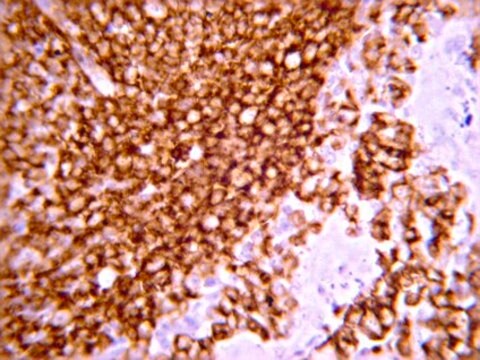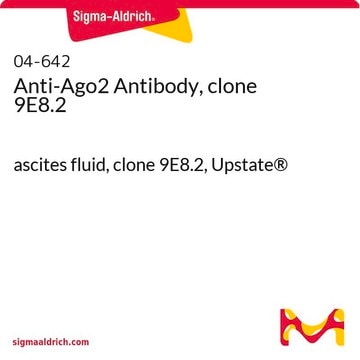SAB4200724
Anti-AGO2 antibody, Mouse monoclonal
clone AGO2-10, purified from hybridoma cell culture
Synonym(s):
Anti-Argonaute RISC catalytic component 2, Anti-Argonaute2, Anti-Eukaryotic translation initiation factor 2C 2, Anti-PAZ Piwi domain protein (PPD), Anti-Protein Argonaute 2, Anti-eIF2C 2
About This Item
Recommended Products
biological source
mouse
Quality Level
antibody form
purified from hybridoma cell culture
antibody product type
primary antibodies
clone
AGO2-10, monoclonal
form
buffered aqueous solution
mol wt
~95 kDa
species reactivity
human
concentration
~1.0 mg/mL
technique(s)
immunoblotting: 2-4 μg/mL using extract of HEK-293T cells transfected with human AGO2
immunoprecipitation (IP): 10-20 μg/test using HeLa cells extract
isotype
IgG1
UniProt accession no.
shipped in
dry ice
storage temp.
−20°C
target post-translational modification
unmodified
Gene Information
human ... AGO2(27161)
General description
Immunogen
Application
Biochem/physiol Actions
Physical form
Disclaimer
Not finding the right product?
Try our Product Selector Tool.
Storage Class Code
10 - Combustible liquids
WGK
WGK 1
Flash Point(F)
Not applicable
Flash Point(C)
Not applicable
Choose from one of the most recent versions:
Certificates of Analysis (COA)
Don't see the Right Version?
If you require a particular version, you can look up a specific certificate by the Lot or Batch number.
Already Own This Product?
Find documentation for the products that you have recently purchased in the Document Library.
Our team of scientists has experience in all areas of research including Life Science, Material Science, Chemical Synthesis, Chromatography, Analytical and many others.
Contact Technical Service








